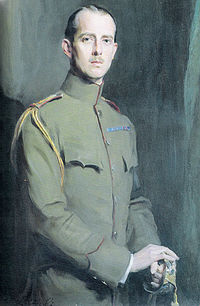Prince Andrew of Greece and Denmark Royalty
Prince Andrew of Greece and Denmark (Andreas; 2 February 1882 (N.S.) – 3 December 1944) of the House of Schleswig-Holstein-Sonderburg-Glücksburg, was the seventh child and fourth son of King George I of Greece and Olga Constantinovna of Russia. He was a grandson of Christian IX of Denmark and father of Prince Philip, Duke of Edinburgh.He began military training at an early age, and was commissioned as an officer in the Greek army. His command positions were real appointments rather than honorary, and he saw service in the Balkan Wars. In 1913, his father was assassinated and Andrew's elder brother, Constantine, became king. Dissatisfaction with his brother's neutrality policy during World War I led to his brother's abdication and most of the royal family, including Andrew, was exiled. On their return a few years later, Andrew saw service in the Greco-Turkish War (1919–1922), but the war went badly for Greece, and Andrew was blamed, in part, for the loss of Greek territory. He was exiled for a second time in 1922, and spent most of the rest of his life in France.By 1930, he was estranged from his wife, Princess Alice of Battenberg. His only son, Prince Philip, served in the British navy during World War II, while all four of his daughters were married to German royals, three of whom had Nazi connections. Separated from his wife and son by the effects of the war, Andrew died in Monte Carlo in 1944. He had seen neither of them since 1939.
Personal facts

| Birth date | February 02, 1882 |
|---|---|
| Birth place | |
| Date of death | December 03, 1944 |
| Place of death | |
| Resting place | |
| Parents | George I of Greece Olga Constantinovna of Russia |
| Spouse |